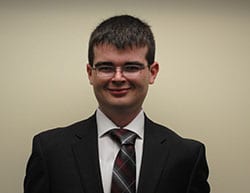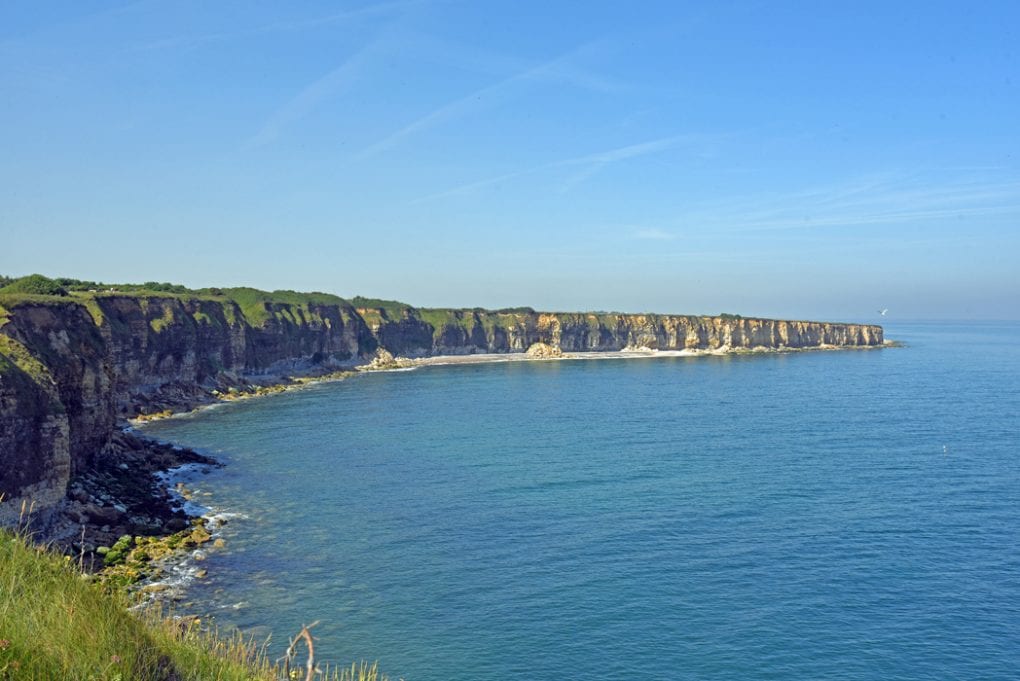For this month’s Scholar Spotlight we talked to senior Highland Capital Management Tower Scholar Tim Smith ’19, recipient of the Marian Tower Scholarship, about his experience on the inaugural SMU-in-Normandy: History of D-Day & Europe’s Liberation study abroad program. Smith is majoring in political science and history with minors in philosophy, international studies, and public policy and international affairs.
Why did you decide to go on the SMU-in-Normandy trip?
 I developed a fascination for World War II at a very young age. Maybe even too young. At one of my elementary school book fairs, when I was still enraptured with the idea of the military and warfare as all boys are at that age, I purchased Usbourne’s Introduction to the Second World War by Paul Dowswell. I read it from cover to cover many times over in its full depiction of the war without really grasping what took place until later–but I did love the battle stories, and none were more compelling as the stories about the D-Day invasions. I was hooked.
I developed a fascination for World War II at a very young age. Maybe even too young. At one of my elementary school book fairs, when I was still enraptured with the idea of the military and warfare as all boys are at that age, I purchased Usbourne’s Introduction to the Second World War by Paul Dowswell. I read it from cover to cover many times over in its full depiction of the war without really grasping what took place until later–but I did love the battle stories, and none were more compelling as the stories about the D-Day invasions. I was hooked.
When Professor Jeffrey Engel told my junior history seminar about the beginning of the SMU-in-Normandy program, I had no real choice but to apply.
Luck let me be among the inaugural class of students for the program, and I got to live out a dream.
Tell us about your experience.
The trip itself was a crash course in the Operation OVERLORD operation procedures over the course of eight days spanning from London, England to the OMAHA, SWORD and JUNO beaches and ending up in Paris, France, with many great stops and points of interest along the way. The amount of places to visit and items to do every day made every day an unforgettable experience, if also a tiring one. I wouldn’t trade it for the world though.
What was the most memorable part of the trip for you?
Pointe du Hoc may very well be the crystallization of the experience for me. Pointe du Hoc was a critical point to hold for U.S. Army Rangers in the assault on Normandy, as several German bunkers were atop the cliffside which allowed Nazi batteries to fire on the approaching transports for the landing groups. Taking the cliff was a costly endeavor for the Rangers that day, but they succeeded and made sure that further personnel could come ashore down the beaches.
It was early morning when our study abroad group arrived at Pointe Du Hoc, which has been preserved as a monument to the sacrifices of the rangers who assisted in the liberation of France. A pea-soup fog was still settled over the top of the cliff where we were touring, and it was impossible to even see the roaring English Channel from anything but the cliff edge. And with this eerie atmosphere settled over the former battleground, we got to walk freely among and inside the German artillery positions.
It was a moving sight and experience. Stepping on those hallowed grounds, I believe I understood something that can’t be taught except by experience: WWII had altered the landscape, the lives and the way of thought for the whole of Europe. The United States’ continental territory was never used as a battleground in the 20th century, but for most of Europe, the reminders are ever present. Pointe du Hoc is one of countless reminders in Europe for the French, English, Germans and others of the continent about what can happen when humanity forgets itself in pursuit of other goals.
What has been your favorite part of the Tower Scholars Program?
The wealth of knowledge that Highland Capital Management Tower Scholars have access to in their courses and through the resources offered to them is oftentimes too much for them to even adequately use! Whether it be the practitioners that we bring in such as Fred Chang and Diana Newton or the wonderful advisers and staff at the program, there is always a connection that can be made to match that of the Scholars’ interests and fields of study which will enable us to more fully reach our potential. These people have been indispensable sources of information and feedback, without whom I would not be where I am today.
What’s the most important thing you’ve learned?
It was in PPIA 3301 (our junior seminar) with Ret. Brigadier General Patrick Mordente, director of the George W. Bush Presidential Library, that I learned a lesson that I try to employ in my day-to-day affairs as much as possible. General Mordente was describing his service in the air force and the process that he went through on his officer track that he said he was told by his senior officer (and I paraphrase here), “Welcome to the last bad day of your life.” What that means is that as a leader, as somebody who is responsible for the work and well-being of others, you have to put aside whatever it is that you might be haunting you in your other spheres of life and focus on being the man/woman that the people you are leading need you to be. Your own domestic affairs might be falling to the bits, there might be a lot of other things on your mind, but when you are leading others, then you have to put aside those concerns and be there for others.
In my eyes, that is what leadership is. I can only hope that I am abiding by this the best I can.
What’s next for you?
This is where I walk into uncertain terrain. More than anything, I know where I want to be: Washington, D.C. In the few times I’ve visited, I still walk away stunned and wanting to come back and do more inside the beltway. But as for what I think comes next, I’m uncertain. Opportunities abound and it’s up for me to chase them, but I enter this next phase after graduation confident that my experience as a Highland Capital Management Tower Scholar will prepare me for a great deal of the hurdles yet to come.
